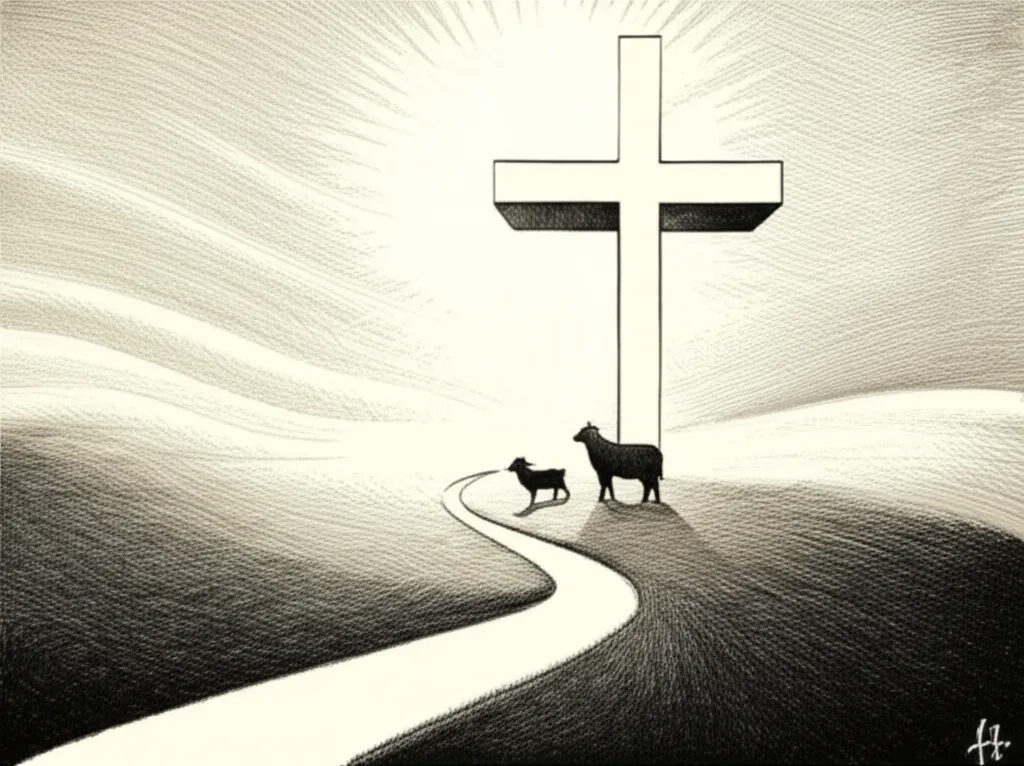In our daily walk of faith, we often encounter moments that challenge our understanding of God's will and the true meaning of devotion. Today's readings offer profound insights into these complexities, inviting us to reflect on mercy, sacrifice, and the ultimate liberation found in Christ. As we navigate the demands of modern life, let us delve into these scriptures, seeking wisdom and guidance for our spiritual journey.
The Passover: A Shadow of Redemption
The first reading from Exodus recounts the institution of Passover, a pivotal event in the history of Israel (Exodus 11:10-12:14). God commands the Israelites to sacrifice a lamb and mark their doorposts with its blood, a sign of protection from the impending plague. This act of obedience and faith foreshadows the ultimate sacrifice of Christ, the Lamb of God, whose blood saves us from eternal destruction.
Just as the Israelites were instructed to partake of the lamb with unleavened bread and bitter herbs, symbolizing their hasty departure from slavery, we too are called to remember our liberation from sin through Christ's sacrifice. This remembrance is not merely a historical exercise but a living reality, as we participate in the Eucharist, the new Passover, where we receive the body and blood of Christ.
The early Church Fathers emphasized the importance of understanding the Old Testament as a preparation for the New. They saw in the Passover lamb a prefigurement of Christ, highlighting that the Old Covenant found its fulfillment in the New. This perspective encourages us to see the continuity of God's plan of salvation throughout history, recognizing that Christ is the center of both the Old and New Testaments.
Mercy Over Sacrifice: A Call to Compassion
In the Gospel reading, Jesus and his disciples are confronted by the Pharisees for picking grain on the Sabbath (Matthew 12:1-8). Jesus defends their actions by referencing David's example and reminding the Pharisees of the principle, "I desire mercy, not sacrifice." This statement challenges the rigid legalism of the Pharisees, who prioritized ritual observance over genuine compassion.
Jesus' words echo the teachings of the prophets, who consistently condemned empty religious practices devoid of love and justice. True worship, as God desires, is not merely about performing rituals but about showing mercy and compassion to those in need. This message is particularly relevant in our contemporary world, where we can easily fall into the trap of prioritizing external observances over genuine acts of kindness and charity.
One of the great Doctors of the Church, reflected deeply on the nature of love and its role in the Christian life. He taught that love is the foundation of all virtues and that without love, even the most impressive acts of piety are meaningless. This perspective challenges us to examine our own motivations and ensure that our actions are rooted in love for God and neighbor.
The Lord of the Sabbath: Freedom in Christ
Jesus declares himself "Lord of the Sabbath," asserting his authority over the law and emphasizing that the Sabbath was made for man, not man for the Sabbath. This statement underscores the freedom we have in Christ, who liberates us from the bondage of legalism and invites us into a relationship of love and grace.
The Sabbath, originally intended as a day of rest and spiritual renewal, had become burdened with countless restrictions and regulations. Jesus restores the true meaning of the Sabbath by demonstrating that acts of mercy and compassion are not violations of the law but rather expressions of its true intent.
This understanding of freedom in Christ is essential for navigating the complexities of modern life. We are often bombarded with rules and expectations, both from within and without, that can stifle our spiritual growth and hinder our ability to live authentically. Christ calls us to break free from these chains and embrace the freedom to love, serve, and worship God with all our heart, soul, and mind.
A Perpetual Striving Towards God
One of the Cappadocian Fathers, spoke of the soul's perpetual striving towards God, a concept known as "epektasis." This idea suggests that our spiritual journey is not a static destination but a dynamic process of growth and transformation. Just as the Israelites were called to celebrate the Passover as a perpetual institution, we too are called to continually seek God and deepen our relationship with him.
This perspective encourages us to embrace the challenges and uncertainties of life as opportunities for spiritual growth. Even in the midst of suffering and doubt, we can trust that God is leading us towards greater union with him. Our faith is not a passive acceptance of doctrines but an active engagement with the living God, who invites us to participate in his divine life.
Conclusion
As we conclude our reflections on today's readings, let us be reminded of the profound truths they reveal. The Passover foreshadows our redemption in Christ, the call to mercy challenges our legalism, and the freedom of the Sabbath invites us into a deeper relationship with God. May we embrace these truths and live them out in our daily lives, becoming true disciples of Christ, who embodies both justice and compassion.
